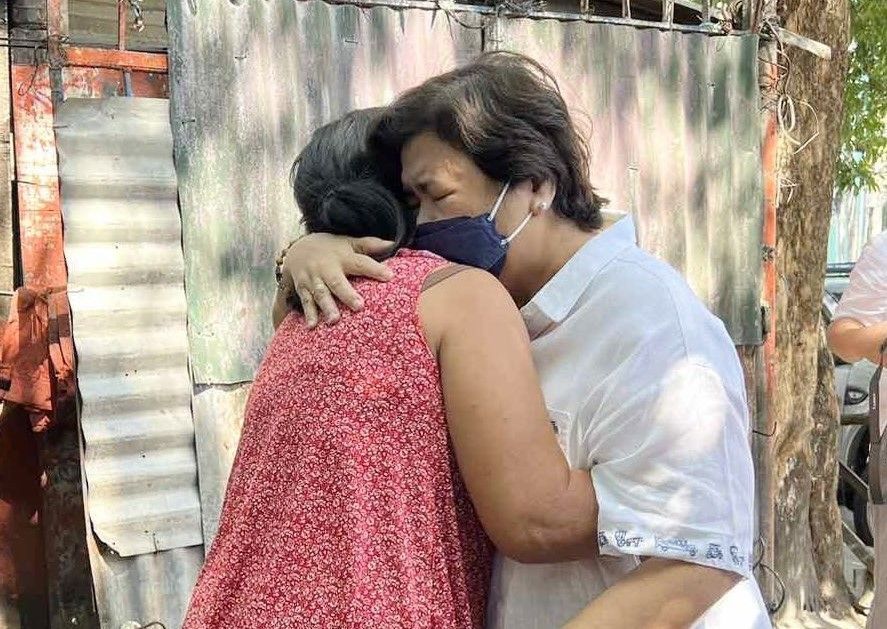CHR, Migrante call for justice and reforms after Kuwait OFW's killing

MANILA, Philippines — The Commission on Human Rights and Migrante International are hoping for swift justice for slain overseas Filipino worker Jullebee Ranara, whose burnt body was found in a desert in Kuwait over the weekend.
In separate statements on Wednesday, the CHR said they are monitoring the progress of Ranara’s case, while Migrante is calling on the government to push for reforms of or even the abolition of the Kafala system in the Gulf state.
The kafala system, which is in place in Bahrain, Jordan, Kuwait, Lebanon, Oman, Qatar and the United Arab Emirates, requires migrant workers to be sponsored by a citizen or company in the host country. Sponsors have nearly total control over workers’ employment and immigration status, leaving them prone to abuse and exploitation.
The Philippine Embassy in Kuwait noted that the 17-year-old suspect, the son of Ranara’s employer, has already been arrested. Arab Times Online reported that Ranara’s autopsy showed that she was pregnant at the time of her death, but local authorities are still investigating the incident.
The 35-year-old was working as a domestic worker in Kuwait and both the Department of Migrant Workers and the Department of Foreign Affairs are coordinating with Kuwaiti authorities.
In a statement dated January 24, the embassy said it is also waiting for the release of Ranara’s remains to take her back home.
READ: Philippines working with Kuwaiti authorities on case of slain OFW
"The Commission acknowledges the swift action of DMW, through Secretary Susan Ople, who met with Jullebee’s family and guaranteed necessary assistance from the government," the CHR said.
CHR: ‘One death is too many’
The CHR is calling on the government to work with other states in ensuring humane working conditions in host countries. Meanwhile, the commission also notes that adapting mechanisms such as “information sharing, access to legal aid, and quick response protocols” will be useful for OFWs.
"It is clear that full implementation of employment standards—including safe working conditions, timely remuneration, and protection from maltreatment—in line with migrants’ human rights, must be demanded by the Philippines from foreign employers and other States," the commission said.
The CHR said migrant workers and their families in need of legal assistance may avail of its e-Lawyering program.
In 2018, the CHR also called on the government to review its policies to ensure the protection of OFWs, particularly of domestic workers, after seven OFWs deployed in Kuwait died.
The commission also noted “alarming reports of distressed OFWs” are seeking repatriation.
In Kuwait alone, the DMW said they are working to bring home over 400 OFWs who sought shelter in the Philippines’ “Kalinga” (care) center there. Most workers at the center are waiting for clearance to go back home, while the some have pending cases.
“We ask DMW to investigate this matter with equally great urgency,” the CHR said.
READ: Migrant workers department seeks repatriation of 300 distressed OFWs in Kuwait
Migrante: Previous efforts went nowhere
Meanwhile, a coalition of OFW groups have noted that previous government efforts to protect workers in Kuwait were "failures."
"It is clear that President Rodrigo Duterte’s OFW ban to Kuwait in 2018 and his appeal to Arab countries to treat OFWs with dignity and respect are failures," Migrante said, adding that the government should "push for measures that will alleviate the working and living conditions" of OFWs deployed there.
The migrant workers coalition also noted the deaths of Joanna Demafelis in 2018 as well as Constancia Dayag and Jeanelyn Villavende in 2019. The three were domestic helpers in Kuwait who died at the hands of their employers.
The deaths of Demafelis and Villavende led to the deployment ban of Filipino workers to Kuwait in 2018 and in January 2020, respectively. The deployment ban in 2018 was lifted only after a bilateral agreement was inked but the provisions to protect OFWs are not enough.
"New contracts stipulating one day-off for OFWs per week and their working and sleeping hours are not enough," Migrante said.
RELATED: Rights group hits Qatari authorities, FIFA for 'callous' response after OFW death
The coalition also added that the embassy in Kuwait should be "more alert and attentive" to the needs of migrant workers there and probe any officials found to be neglecting their duty to Filipinos.
"The real solution is an end to the government’s Labor Export Program and the generation of decent jobs within the country which, we believe, are only possible through genuine land reform and national industrialization," Migrante said.
- Latest
- Trending






























